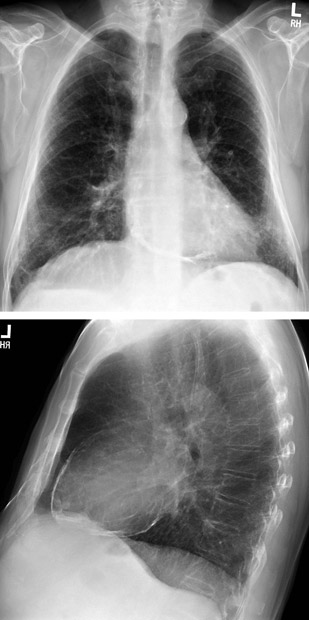MKSAP Quiz: 1-year history of edema, abdominal distention
A 72-year-old man is evaluated for a 1-year history of bilateral lower extremity edema and abdominal distention. Eight years ago he had esophageal carcinoma treated with radiotherapy. Medical history is otherwise significant for hypertension, type 2 diabetes mellitus, and hypercholesterolemia. Medications are bumetanide, atorvastatin, metformin, and lisinopril.
On physical examination, the patient is afebrile, blood pressure is 170/90 mm Hg, pulse rate is 90/min, and respiration rate is normal. Jugular venous distention is present to the angle of the mandible while seated, with prominent pulsations. Cardiac examination reveals an early diastolic sound at the apex. The liver is palpable 5 cm below the costal margin. The abdomen is distended with ascites. There is bilateral pitting edema to the level of the thighs. Pulmonary examination reveals no crackles.

Laboratory studies are significant for a B-type natriuretic peptide level of 96 pg/mL (96 ng/L).
Chest radiographs are shown. A 12-lead electrocardiogram demonstrates normal sinus rhythm with normal QRS voltage. Echocardiogram demonstrates normal right and left ventricular size and function. Left ventricular wall thickness is normal. Mild tricuspid regurgitation is present. There is respiratory variation in the filling of the right and left ventricles, ventricular septal shift during respiration, and dilation of the inferior vena cava. The estimated right ventricular systolic pressure is 46 mm Hg. There is no pericardial effusion.
Which of the following is the most likely diagnosis?
A. Cardiac amyloidosis
B. Constrictive pericarditis
C. Heart failure with preserved ejection fraction
D. Restrictive cardiomyopathy
Answer and critique
The correct answer is B. Constrictive pericarditis. This item is Question 91 in the Cardiovascular Medicine section.
The most likely diagnosis in this patient with a history of chest radiotherapy is constrictive pericarditis. Constrictive pericarditis is characterized by pericardial thickening, fibrosis, and sometimes calcification that impair diastolic filling and limit total cardiac volume. Most cases are viral or idiopathic in origin; however, cardiac surgery, chest irradiation, autoimmune disease, and tuberculosis or other bacterial infections may be causes. Patients with constrictive pericarditis most commonly present with indolent progression of right-sided heart failure symptoms, including peripheral edema, ascites, and fatigue. In this patient, signs of venous congestion predominate, pericardial calcification is present on the chest radiograph, and the serum B-natriuretic peptide level is low and does not suggest greatly increased wall tension. The echocardiographic findings of respiratory variation in filling of right and left ventricles, ventricular septal shift during respiration, and dilation of the inferior vena cava are characteristic of constrictive pericarditis.
Cardiac amyloidosis and restrictive cardiomyopathy are not associated with pericardial calcification, and patients with these conditions more commonly present with moderate to severe pulmonary hypertension rather than the mild pulmonary hypertension seen in this patient. Respiratory variation in filling of the right and left ventricles and ventricular septal shift during respiration are characteristic of pericardial constraint rather than myocardial disease.
Patients with heart failure with preserved ejection fraction will present with edema, exertional dyspnea, and fatigue. Normal systolic contraction and abnormal diastolic relaxation are present on echocardiogram and result in restricted filling and high filling pressures. Patients with heart failure typically have an elevated B-type natriuretic peptide level, often greater than 600 pg/mL (600 ng/L), which is not found in this patient.
Key Point
- Constrictive pericarditis is commonly characterized by symptoms of right-sided heart failure, low or normal B-type natriuretic peptide level, and the finding of pericardial thickening or calcification on imaging studies.




